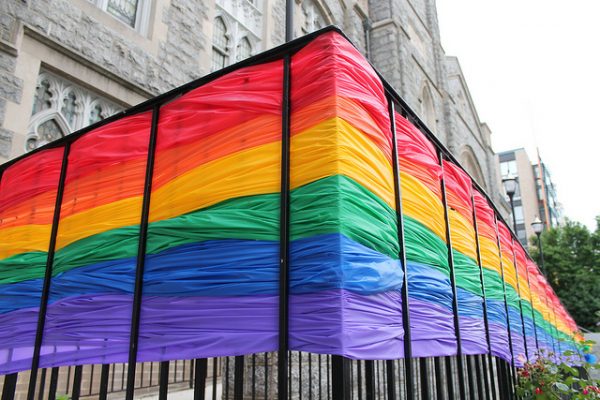
Originally published on June 29, 2018.
In the United States, tension between religious institutions and the LGBT community persists, even after the legalization of same-sex marriage. While some faith groups are becoming open and affirming, the recent Supreme Court decision in Masterpiece Cakeshop v. Colorado Civil Rights Commission and stories of LGBTQIA+ exclusion at religiously-affiliated institutions like Hope College and Wheaton College show continued conflict between religion and sexuality, even in an era when Americans have become more accepting of same-sex relationships. Social science research shows that these challenges continue, but it also demonstrates how people don’t always have to choose between faith and being faithful to who they are.
Religious institutions are clearly changing. Even churches without formal welcoming statements often accept LGBT members, sometimes in contrast to the policies of their national organizations. At the same time, queer students are both learning to navigate their identities on religious campuses, and engaging in direct activism to create more welcoming and inclusive organizations.
- Andrew L. Whitehead. 2018. “Institutionalized Norms, Practical Organizational Activity, and Loose Coupling: Inclusive Congregations’ Responses to Homosexuality.” Journal for the Scientific Study of Religion 56(4): 820–35.
- Jonathan S. Coley. 2018. Gay on God’s Campus: Mobilizing for LGBT Equality at Christian Colleges and Universities. Chapel Hill: University of North Carolina Press.
- Robbee Wedow, Landon Schnabel, Lindsey K. D. Wedow, and Mary Ellen Konieczny. 2017. “‘I’m Gay and I’m Catholic’: Negotiating Two Complex Identities at a Catholic University.” Sociology of Religion 78(3): 289–317.
Some people who are queer and religious experience tension between their identities, especially when they feel family members, faith leaders, or friends want them to choose one or the other. But other people work out all kinds of ways to be both religious and queer at the same time, from different doctrinal interpretations to forging their own communities.
- Tanya Erzen. 2006. Straight to Jesus : Sexual and Christian Conversions in the Ex-Gay Movement. Berkeley: University of California Press.
- Melissa M. Wilcox. 2009. Queer Women and Religious Individualism. Bloomington, IN: Indiana University Press.
- Dervla Sara Shannahan. 2009. “Sexual Ethics, Marriage, and Sexual Autonomy: The Landscapes for Muslimat and Lesbian, Gay, Bisexual, and Transgendered Muslims.” Contemporary Islam 3(1): 59–78.

Comments